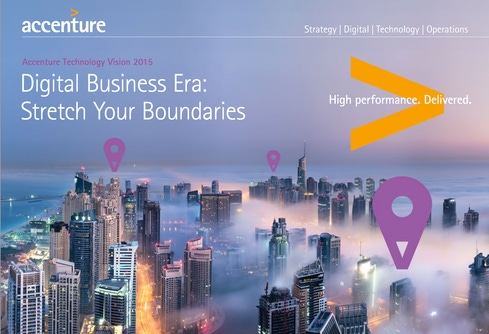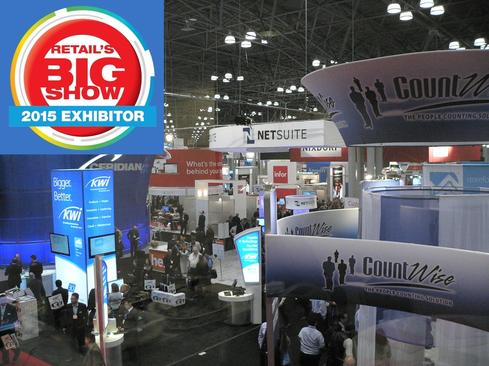Accenture sees the boundaries between industries dissolving as connected devices proliferate. How will this change the value proposition for IT in your organization?


9 CIO Tech Priorities For 2015
9 CIO Tech Priorities For 2015 (Click image for larger view and slideshow.)
The boundaries between businesses have become blurred as computing platforms turn separate industries into interconnected ecosystems, according to a new report from Accenture. While this concept may be nothing new for companies that earn their keep selling technology, for many enterprises it offers a way to rethink the value that IT can bring to your organization.
Global IT consultancy Accenture calls this trend the "We Economy." Sure, we admit to the temptation to elide the phrase into jargon fit for Elmer Fudd: "Weconomy." But, in all seriousness, there's more here for IT than you might think. Let's imagine, for instance, that a project your IT team is working on to meet an internal business requirement is seen as so attractive that another company wants to partner with yours to create a new application for commercial use. Bingo: A new line of business is formed.
That way of thinking is one part of what Accenture is talking about in the Accenture Technology Vision 2015 report, which features results from the firm's annual global survey of more than 2,000 IT and business executives. The full report will be available on Feb. 17. According to the report, 81% of survey respondents believe industry boundaries will fade as platforms connect businesses to one another.
A platform -- Google's Android, Ford's Sync, or Amazon Web Services, for example -- provides a standard structure that helps businesses and customers interact. Platforms are valuable because they give their owner the power to charge for access, and because they create new business opportunities.
[ Learn all about Ford's big plans for its mobility platform. Read Ford Mobility Plan Searches For Growth Beyond Cars. ]
As an example, the Accenture report points to the way that Philips is trying to take its healthcare practice beyond producing medical equipment by teaming up with Salesforce to create a platform for healthcare applications. By integrating data from a variety of sources, Philips aims to enhance healthcare decision making for businesses and individuals. That's a service that could be valuable.
The report pointed to other companies taking similar steps. There's Fiat's Uconnect platform, which provides opportunities for navigation service providers and media partners to reach Fiat customers. Home Depot is working with makers of connected home devices to ensure compatibility with the Wink connected home system, which it distributes. And the list goes on.
"By tapping into the digital ecosystem, ordinary businesses can tackle challenges that were previously well beyond their scope," the report said.
As a measure of business interconnection, Accenture found that 35% of respondents are currently using partner APIs to integrate data and work with business partners and that another 38% have plans to do so.
In its report, Accenture identified five technology trends shaping the way businesses are adapting to the "We Economy":
The "Internet of Me." This is a way to describe personalization efforts. Respondents to the Accenture survey are exploring emerging digital channels through which they can engage with customers, including wearables (62%), connected TVs (68%), connected cars (59%) and smart objects (64%).
The "Outcome Economy." This term describes how digital devices enable business models based on selling results -- an app that helps people find a parking space, for example -- rather than things. In less obtuse language, Accenture is talking about selling services that weren't possible before the era of cloud computing, mobile devices, and ubiquitous sensors.
The "Platform Revolution." Here, the might of the major platform players -- Amazon, Apple, Google, and Microsoft -- is obvious, but Accenture's survey respondents see an opportunity for industry players. Some 75% of them believe that industry players and leaders will guide the next generation of platforms, rather than today's technology giants. Their opinions may arise from the fact that almost as many (74%) say they're using or experimenting with industry platforms to integrate data from business partners. Most companies evidently are eager to minimize their dependence on large platform companies.
The "Intelligent Enterprise." This is based on the expectation that software-driven decision-making will become more intelligent, thanks to advances in processing power, machine learning, and data science. Some 78% of survey respondents expect that "successful businesses will manage employees alongside intelligent machines – ensuring collaboration between the two."
The "Workforce Reimagined." Here, Accenture found that 78% of survey respondents expect that, within three years, the care and training of technological systems -- decision-making software and machine learning systems -- will require a level of attention comparable to resources now devoted to people. In tomorrow's workplace, HAL 9000 may be sitting in the adjacent cubicle.
Are you currently developing projects or platforms that you hope will be embraced outside your company? Is the "We Economy" really a thing, and how is it different from good, old-fashioned collaboration? Can the "We Economy" help IT prove its value to the enterprise? Tell us what you think in the comments section below.
Attend Interop Las Vegas, the leading independent technology conference and expo series designed to inspire, inform, and connect the world's IT community. In 2015, look for all new programs, networking opportunities, and classes that will help you set your organization’s IT action plan. It happens April 27 to May 1. Register with Discount Code MPOIWK for $200 off Total Access & Conference Passes.
About the Author(s)
You May Also Like







